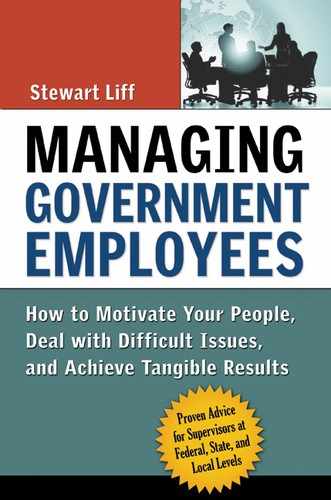Chapter 1
1 Remarks by Vice President Al Gore, opening session of International Reinventing Government (REGO) Conference, Thursday, January 14, 1999.
2 The Freedom of Information Act, 5 U.S.C. § 552, as Amended by Public Law No. 104-231, 110 Stat. 3048. State and local governments are usually covered by a state version of the Freedom of Information Act.
3 Measuring Difference Between Federal and Private Pay, A Congressional Budget Office paper, November 2002.
4 Comparing the Federal Employee Benefits with Those in the Private Sector, A Congressional Budget Office Paper, August 1998.
5 Steven Malanga, “Government Pay, Benefits Soar,” Budget and Tax News (February 1, 2006).
6 John L. Guerra, “Alternate Pay Systems Must Accompany Mission Redefinition,” Government Leader (October 18, 2005).
7 “Feds Favor Easier Removal of Poor Performers,” www.FedSmith.com.
8 Michael H. Cimini, “1982–97 State and Local Government Work Stoppages and Their Legal Background,” Compensation and Working Conditions (Fall 1998).
9 www.kentlaw.edu/classes/mmalin/Public%20Sector%20Employment/chapter9.htm.
10 Hart-Teeter Research for the Partnership for Public Service, Survey of Nonfederal Workers’ Attitudes Toward Government Employment, October 2002.
11 Paul Nowack, quoted by John Rossheim in Working for the Government, Monster.com.
12 It is much easier to move around within a particular segment of government (federal, state, or local) than it is between segments, because the promotion rules generally apply only to people working for that particular segment.
13 “Backgrounder on the Pendleton Act,” Basic Readings in U.S. Democracy, http://usinfo.state.gov/usa/infousa/facts/democrac/28.htm.
14 Ibid.
15 www.Governing.com, “Grading States,” Congressional Quarterly, Inc.
16 David Osborne and Peter Plastrik, “Civil Action,” The Washington Post Magazine (June 8, 1997), pp. 8–14.
17 Conducted under the direction of the Princeton Survey Research Group and led by Mary McIntosh between February 7 and June 1, 2001.
18 “Feds Favor Easier Removal of Poor Performers,” FedSmith.com.
19 Federal Supervisors and Strategic Human Resources Management, U.S. Merit Systems Protection Board, June 1998.
Chapter 2
1 Dean Smith, D. Gerald, John Kilgo, and Roy Williams, The Carolina Way: Leadership Lessons From a Life in Coaching (New York: Penguin Books, 2004).
2 Paul Gustavson, “Designing Effective Work Systems for Greenfield Sites” (November/December 1988).
3 The management systems are (a) the technical systems (tasks, technology, and physical arrangements); (b) structural systems (how people are organized and what they are organized around); (c) decision-making and information systems (What decisions need to be made? What information is needed? How are decisions made?); (d) people systems (how you select, train, and promote people); (e) rewards systems (intrinsic and extrinsic rewards); and (f) renewal systems (How will the organization renew itself?). Gustavson, “Designing Effective Work Systems for Greenfield Sites.”
4 Jack Welch and J. A. Byrne, Jack: Straight from the Gut (New York: Warner Books, 2001).
5 Ibid.
Chapter 3
1 The Ned Herrmann Brain Dominance Instrument was developed by Ned Herrmann while the manager of management education at GE’s Crotonville Office.
2 Stewart Liff and Pamela A. Posey, D.B.A., Seeing Is Believing: How the New Art of Visual Management Can Boost Performance Throughout Your Organization (New York: AMACOM Books, 2004).
3 Tom Peters, In Search of Excellence: Lessons from America’s Best Run Companies (New York: Warner Books, 1982).
4 Jennifer Newman and Darryl Grigg, “Saying Thanks at Work,” Vancouver Sun, (March 22, 2004).
1 In the federal government, a disciplinary action is an admonishment, reprimand, or suspension of 14 days or less. An adverse action is suspension of more than 14 days, a demotion, or a removal.
Chapter 6
1 For example, see Gerald H. Graham and Jeanne Unruh, “The Motivational Impact of Nonfinancial Employee Appreciation Practices on Medical Technologists,” Health Care Supervisor, 8(3) (1990), pp. 9–17.
2 A business line division provides a service that is directly related to a government organization’s mission (e.g., patient care, processing claims, investigating security clearances, collecting taxes, etc.).
Chapter 7
1 In May 2006, a VA employee took home a laptop computer that compromised the privacy of 26,000,000 veterans and over 1,000,000 active duty service members. The laptop has subsequently been found, and personal information apparently was not compromised.
2 Other factors also contributed to VHA’s success, including a state-of-the-art medical records system, consolidation of operations, and so on.
3 Many government organizations have a “use or lose” policy. That is, you can carry over only a certain amount of vacation time from year to year. If you don’t use the excess vacation time, you simply forfeit it.
Chapter 8
1 In many cases, certain issues are excluded from the grievance procedure. For example, selections for promotion may be excluded, as well as any other issues that the parties agree upon.
2 This statement is particularly applicable to the federal government, where unions cannot negotiate pay. However, the teachers’ union, the police officers’ union, and others are still strong because they can negotiate on far more issues, including pay, which makes the employees want to support them.
Chapter 9
1 The SMSA is composed of a core area containing a substantial population nucleus, together with adjacent communities having a high degree of economic and social integration with that core. U.S. Census Bureau, Population Division, Population Distribution Branch. Last revised: June 7, 2005.
2 The Americans with Disabilities Act and similar state laws prohibit employers from discriminating against qualified individuals with disabilities. In 1992, the substantive employment standards of the Americans with Disabilities Act, 42 U.S.C. Section 12111, et seq., were made applicable to the federal government through the Rehabilitation Act.
3 I have seen instances where someone constantly wants to refer every issue to mediation. This can be very time consuming, since ADR involves a fair amount of preparation time and may require several long-drawn-out meetings. Under these circumstances, I would be reluctant to refer every issue to ADR.
